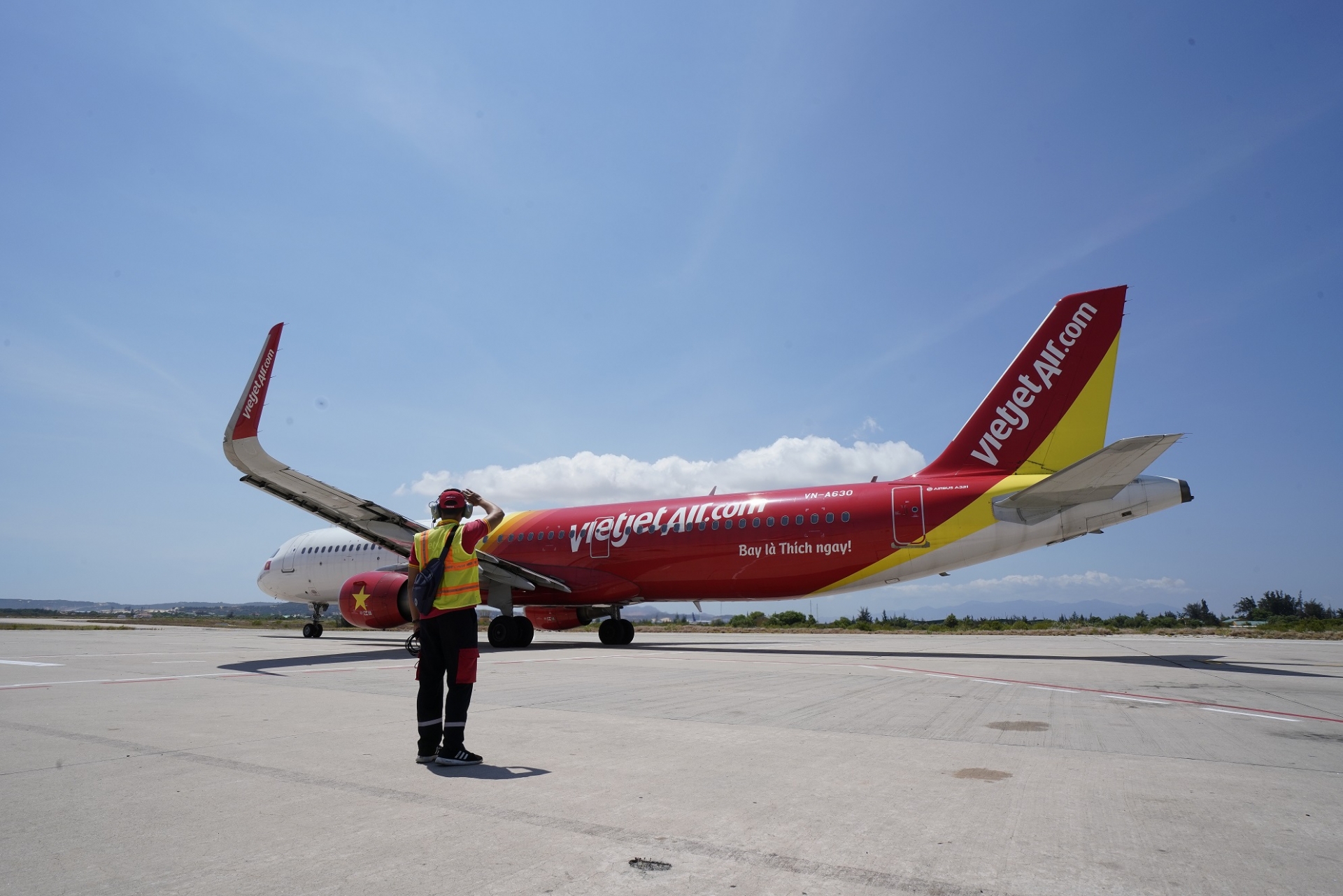Vietjet fares well in first half of 2019
 |
| Vietjet is regarded as a high-profile "consumer airline" |
The growing trend of budget aviation is projected to become the future of the global aviation industry. Budget airlines are surpassing conventional airlines in Asia, Europe, and the United States. Similar trends are also taking place in Vietnam’s aviation market where Vietjet and Jetstar account for a combined 58 per cent market share. Vietjet operates 68,821 flights and transported 13.5 million passengers in all networks, bringing the total number of the passengers it has transported to 83 million.
New growth room for international routes
In the first half of 2019, Vietjet's air transport revenue was VND20.148 trillion ($876 million), increasing by 22 per cent, and pre-tax profit was VND1.563 trillion ($67.96 million), an increase of 16 per cent on-year.
In the first six months, Vietjet continued to expand its flight network in both local and overseas markets. Besides the opening of three domestic routes to Can Tho, Vietjet opened nine international routes to favourite tourism destinations like Japan, Hong Kong, Indonesia, and China.
The exploitation of the international flight market has helped Vietjet maintain its growth when the domestic market faced overloaded infrastructure. International flights also helped the company earn more foreign currency revenues and benefit from exchange rate differences as well as lower fuel costs in the country.
About other operating results, the revenue passenger kilometers (RPK) stood at 16.3 billion, up 22 per cent on-year, the load factor averaged at 88 per cent, technical reliability was 99.64 per cent, and on-time performance (OTP) reached 81.5 per cent.
Enterprises recorded positive growth when consolidated revenue reached VND26.3 trillion ($1.14 billion), up 24 per cent and pre-tax profit reached VND2.398 trillion ($104.26 million), up 11 per cent compared to the same period last year.
A high-profile “consumer airline”
The Asia-Pacific region is enjoying the highest aviation growth in the world. The international market has had large room to grow and good profit margin thanks to ancillary revenue, a low fuel cost advantage, and an increase in foreign currency sources. Correspondingly, the number of passengers on international routes grew by 35 per cent to approximately 4 million passengers. The proportion of international revenue surpassed domestic revenue, reaching 54 per cent of total air transport revenue.
Ancillary revenue is regarded as the key focus area of Vietjet Air to become a high-profile “consumer airline” with e-commerce activities to improve customer experience. Ancillary and cargo revenue was VND5.474 trillion ($238 million), the proportion increased from 21 per cent last year to 27 per cent this year, mainly thanks to the contribution from the growth of international routes.
Vietjet has teamed up with leading partners to develop an e-commerce platform and a mobile wallet. The outlook is unknown, but the ventures will the new-age airline to get a new income stream and capitalise on its customer base. Vietjet aims to roll out the e-commerce platform in the next two years, in partnership with banks, hotels, and other companies. Most recently, Vietjet also introduced a new version of the Vietjet Air app with integrated Vietjet SkyClub membership programme with offering many incentives.
In the first six months, Vietjet’s equity reached to VND15.622 trillion ($679.22 million), up 32 per cent on-year. With positive financial performance in the aviation segment, Vietjet decided to pay 2018 dividend at the rate of 55 per cent, higher than the planned 50 per cent approved at the annual shareholders’ meeting last year.
Solving the problems of aviation personnel
Vietjet Aviation Academy at Saigon High-Tech Park located in Ho Chi Minh City is an international standard, modern training facility with equipment and programmes of European Union Aviation Safety Agency (EASA) standards. The academy organised 250 courses for 5,623 pilots, cabin crews, engineers, and aviation staff in the first six months.
Simulator (SIM) at Vietjet Aviation Academy has started operation in November 2018. So far it has provided 3,178 hours of training for 2,809 trainees and teachers. Vietjet’s SIM center has obtained ATO level 2 certification from EASA, the world’s leading standards.
Especially, Vietjet is one of the few foreign enterprises and the only Vietnamese one nbecoming a member of the Japan Business Federation, the Keidanren, an organisation with a membership comprising of the largest Japanese companies.
With positive business results, regional and worldwide flight network expansion plans, together with the ability to manage costs and operation quality, Vietjet expects to maintain positive growth in the next three years as reported by the Board of Management at the annual general shareholders’ meeting, as well as keeping the leading position in the domestic transport segment and effectively expanding international routes.
Vietjet also considers opportunities for investment in infrastructure, terminals, technical services, ground services, training, as well as promoting the efficiency and advantages of the airline when expanding to provide aviation services.
What the stars mean:
★ Poor ★ ★ Promising ★★★ Good ★★★★ Very good ★★★★★ Exceptional
Related Contents
Latest News
More News
- The generics industry: unlocking new growth drivers (February 04, 2026 | 17:39)
- Vietnam ready to increase purchases of US goods (February 04, 2026 | 15:55)
- Steel industry faces challenges in 2026 (February 03, 2026 | 17:20)
- State corporations poised to drive 2026 growth (February 03, 2026 | 13:58)
- Why high-tech talent will define Vietnam’s growth (February 02, 2026 | 10:47)
- FMCG resilience amid varying storms (February 02, 2026 | 10:00)
- Customs reforms strengthen business confidence, support trade growth (February 01, 2026 | 08:20)
- Vietnam and US to launch sixth trade negotiation round (January 30, 2026 | 15:19)
- Digital publishing emerges as key growth driver in Vietnam (January 30, 2026 | 10:59)
- EVN signs key contract for Tri An hydropower expansion (January 30, 2026 | 10:57)

 Tag:
Tag:



















 Mobile Version
Mobile Version